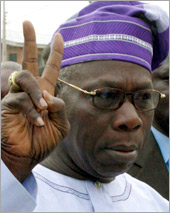Hostages to leave Nigerian rigs
Oil workers who had prevented over 200 other workers leaving four rigs have succumbed to political pressure to evacuate to the mainland
Nigerian oil workers have agreed to release nearly 100 foreigners held on four offshore rigs for over two weeks, a senior union official said on Friday.
“Everybody is expected to be moving home from this evening, depending on logistics,” said deputy president Joseph Akilanja of the umbrella Nigeria Labour Congress (NLC).
“We have just agreed. The company representatives, the NLC and all stakeholders including representatives of the striking workers have agreed,” he said by phone from the venue of the talks in the Nigerian capital Abuja.
 |
|
Nigerian president Olusegun |
Peter Akpatasan, president of the National Union of Petroleum and Natural Gas workers (NUPENG), said: “It was resolved that the four rigs should be downmanned, as requested by the management.”
“All the workers should be brought off the rigs today,” he said after a meeting in Abuja between his union, Nigeria’s top labour body and Transocean Inc, the Houston-based owner of the four rigs.
The captive workers include 35 Britons, 17 Americans and other nationals, plus well over 100 Nigerians, some due for crew rotation since members of the junior oil workers’ union NUPENG launched their strike on 16 April.
Workers now being released said that the expatriates had received death threats after they made a written request to strike leaders to be allowed off the platforms.
Around 100 Nigerian workers belonging to NUPENG blocked helicopter pads and sea access to the rigs, preventing the expatriates and 170 non-striking Nigerians from leaving, according to Transocean Inc.
Akpatasan said that Transocean was now expected to bring all the workers off the rigs by helicopter to the southern Nigerian city of Port Harcourt, and that outstanding labour disputes would be negotiated separately.
Labour leaders negotiating with the management of rig owners Transocean Inc of the United States at talks in Abuja sought agreement that the striking Nigerian oil workers would be able to return to work when the strike was over.
Akpatason said the bone of contention was securing the agreement of Houston-based Transocean, the world’s biggest offshore drilling contractor, that the striking workers will not be laid off en masse.
He said the local branch of NUPENG (National Union of Petroleum and Natural Gas Workers) had agreed earlier to halt their action but later hardened their position after Transocean said all the workers would have to evacuate the rigs.
“The local union objected for fear that they will not be asked to go back,” Akpatason said. “So that is the main issue that has led to the continued holding of the expatriates.”
The Scottish head of Transocean’s Nigerian operation Ian Clarke declined to comment as he went into the talks.
The meeting that broke the deadlock was convened at the initiative of Nigerian President Olusegun Obasanjo after Transocean appealed to him to help, the company’s spokesman Guy Cantwell reported. It is believed that the president had prepared the Nigerian navy to board the rigs in the Gulf of Guinea, off the oil hub of Port Harcourt, if negotiations failed.
The strikers originally wanted reinstatement for five union officials who were disciplined by Transocean, but as the strike continued, workers began to fear for their own jobs as well.
The seizure of the rigs has fuelled concerns over relentless violence in the Niger Delta, which produces most of OPEC-member Nigeria’s mainstay crude oil, despite a violence-free end to the hostage crisis.
Ethnic strife in the western delta region around Warri and Escravos forced Shell, ChevronTexaco and TotalFinaElf to evacuate facilities in the area in March. Nigeria lost 40 percent of its 2.2 million barrels per day of premium light crude at the height of the shutdown.
Three of the rigs that were beseiged are drilling for Shell, including in its prize Bonga field that holds reserves of over one billion barrels of crude. The fourth is contracted to TotalFinaElf.
NUPENG denied the non-striking workers had been hostages, saying its members had refused to allow anyone to leave, fearing they would be dismissed if they were brought ashore before a fresh unionised crew was deployed.
The union says its members still fear they will be sacked, even though they eventually allowed the rigs to be evacuated without waiting for a fresh unionised crew to arrive, as Transocean had demanded.
“Management say everybody should leave the rig. We fear the decision to downman is born of a desire to lay off workers,” NUPENG president Peter Akpatason said. Transocean has not ruled out sackings.